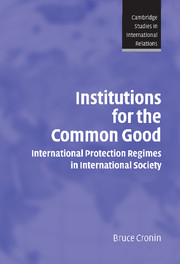Book contents
- Frontmatter
- Contents
- Acknowledgments
- 1 Introduction: international relations theory and the common good
- 2 International protection regimes in an international order
- 3 The national state and the protection of ethnic minorities
- 4 The liberal state and the protection of European citizens
- 5 The multicultural state and the protection of ethnic communities
- 6 The nation-state and the protection of refugees
- 7 Conclusion
- Bibliography
- Index
- CAMBRIDGE STUDIES IN INTERNATIONAL RELATIONS
3 - The national state and the protection of ethnic minorities
Published online by Cambridge University Press: 22 September 2009
- Frontmatter
- Contents
- Acknowledgments
- 1 Introduction: international relations theory and the common good
- 2 International protection regimes in an international order
- 3 The national state and the protection of ethnic minorities
- 4 The liberal state and the protection of European citizens
- 5 The multicultural state and the protection of ethnic communities
- 6 The nation-state and the protection of refugees
- 7 Conclusion
- Bibliography
- Index
- CAMBRIDGE STUDIES IN INTERNATIONAL RELATIONS
Summary
Hannah Arendt argues that the creation of the “national minority” as a permanent institution – a modus vivendi between different ethnic groups living in the same territory – was one of the most unique initiatives introduced in the aftermath of World War I. While the fate of religious minorities had long been an international issue with countries that had a state religion, the political existence of national or ethnic minorities had never before been officially recognized by international institutions.
So long as the states of Europe were conceived as either political/ economic institutions or as the territorial realm of a monarch or emperor, they remained separate from considerations of nationality. This did not change significantly even after the “age of nationalism” swept the continent. Ever since the end of the “great migrations” of the early Middle Ages, there had been relative stability in the composition of the populations within Western Europe. As a result, when these territories became states and later developed a concept of “nationality,” there was a fair degree of ethnic homogeneity within them, at least as “ethnicity” came to be defined in the West.
At the same time, the vast prewar empires of central, eastern and southern Europe had been truly multinational, with no single ethnic group holding a majority. At its height, the Russians comprised only 44 percent of the Romanov empire, the Germans less than 37 percent of Austria-Hungary and the Magyars only 48 percent of the Hapsburg's Hungarian territories.
- Type
- Chapter
- Information
- Institutions for the Common GoodInternational Protection Regimes in International Society, pp. 56 - 89Publisher: Cambridge University PressPrint publication year: 2003



